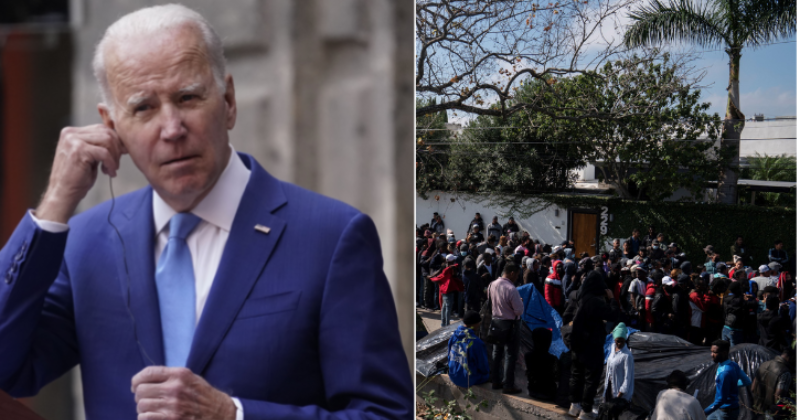In order to prevent more nationalities from requesting asylum in the United States, the United States announced that it would extend COVID-19 pandemic-era restrictions, known as Title 42, to expel migrants from Nicaragua, Cuba, and Haiti caught crossing the U.S.-Mexico border back to Mexico.
The White House also announced that it would provide more legitimate entry points for people from those countries who wish to apply for immigration from abroad.
Jump To
![]()
Why are immigrants barred from entering under COVID regulations?
In order to quickly send migrants crossing the U.S.-Mexico border back to Mexico or other countries, border agents are permitted to use Title 42, which was issued by U.S. health authorities at the start of the COVID-19 pandemic in March 2020. Under Republican former President Donald Trump, whose administration sought to severely restrict both immigration, the order was put into effect. In order to stop the spread of COVID-19 in crowded detention settings, the U.S. Centre for Disease Control and Prevention (CDC) stated at the time that it was necessary.

Reuters
The order has drawn criticism and opposition from some public health professionals, Democrats, and advocates who claim it illegally prevents migrants from requesting asylum and exposes them to dangers like kidnapping and assault in Mexico. Republican states have sued to keep the order in place while immigrant advocacy groups have sued to have it lifted. The legal battle is still ongoing.
Biden’s handling of Title 42
Democratic U.S. President Joe Biden, who took office in January 2021, ran on a pledge to overturn Trump’s restrictive immigration laws.
While working to lift some of Trump’s restrictions, Biden left Title 42 in place for over a year, exempting unaccompanied minors but enabling the US to deport tens of thousands of migrants, including families.

Reuters
Record numbers of migrants have been apprehended trying to enter the United States from Mexico since Biden took office, posing both operational and political difficulties for his administration. Many people have repeatedly crossed into nearby Mexican border cities after being kicked out under Title 42.
And yet initially, only a few nationalities—including Mexican citizens and immigrants from Guatemala, Honduras, and El Salvador—were welcomed back. The expulsions were extended to include Venezuelans in October. Other nationalities have typically been permitted entry into the country to pursue their immigration cases, which has put a strain on some border cities like El Paso, Texas, where many migrants have recently arrived.
Why did the Supreme Court decide the Title 42 case?

AP
In April 2022, the CDC declared that Title 42 would be repealed because, in light of vaccines and other medical advancements, it was no longer necessary to control the spread of COVID-19. However, a federal judge in Louisiana overturned the decision following a legal challenge brought by a group of 20 Republican-led attorneys general from US states who claimed that increased migration would increase costs for their states.
On November 15, 2022, a judge in Washington, D.C., invalidated Title 42 in a separate lawsuit brought by the American Civil Liberties Union (ACLU) and other organisations on behalf of immigrant families who claim that the law hurt them. Title 42 was found to be in violation of federal regulatory law, but U.S. District Judge Emmet Sullivan postponed the decision’s implementation date until December 21 to allow for preparations.
After the decision, a group of Republican-controlled U.S. states filed a request with the U.S. Supreme Court to intervene in the case and defend the continuation of Title 42.

AFP
The states argued that ending Title 42 would “cause an enormous disaster at the border” and leave them bearing the cost of services for new arrivals in a manner similar to that used in the Louisiana case. The policy should continue in effect while the case is being reviewed, the conservatively inclined Supreme Court ruled in December 2022.
Why does Biden want to broaden Title 42?
Following the Supreme Court decision, the Biden administration announced it would begin returning to Mexico under Title 42 migrants from Cuba, Nicaragua, and Haiti who had previously been permitted entry to the country to pursue their immigration cases. The action builds upon an October policy that started expelling Venezuelans while also allowing thousands of migrants from that nation to enter by air if they applied from abroad and could show they had a U.S. sponsor under a new “humanitarian parole” programme.

AFP
According to Biden’s proposal, that programme would be expanded to include more nationalities and could accept 30,000 migrants per month from all four countries combined. People can apply to enter the country legally by air if they have a sponsor in the United States and fulfil certain requirements.
Prior to now, human rights organisations and immigrant advocates have criticised Title 42’s expansion of the nationalities that can be expelled because they claim it no longer has a basis in public health and restricts the availability of asylum.


